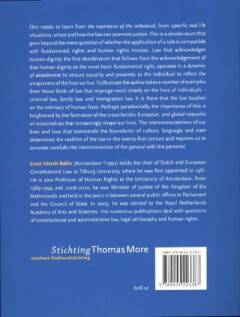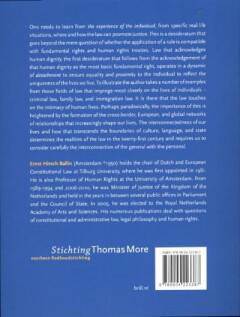
- Afhalen na 1 uur in een winkel met voorraad
- Gratis thuislevering in België vanaf € 30
- Ruim aanbod met 7 miljoen producten
- Afhalen na 1 uur in een winkel met voorraad
- Gratis thuislevering in België vanaf € 30
- Ruim aanbod met 7 miljoen producten
Zoeken


Omschrijving
One needs to learn from the experience of the individual, from specific real-life situations, where and how the law can promote justice. This is a desideratum that goes beyond the mere question of whether the application of a rule is compatible with fundamental rights and human rights treaties. Law that acknowledges human dignity, the first desideratum that follows from the acknowledgement of that human dignity as the most basic fundamental right, operates in a dynamic of detachment to ensure equality and proximity to the individual to reflect the uniqueness of the lives we live. To illustrate the author takes a number of examples from those fields of law that impinge most closely on the lives of individuals - criminal law, family law, and immigration law. It is there that the law touches on the intimacy of human lives. Perhaps paradoxically, the importance of this is heightened by the formation of the cross-border, European, and global networks of relationships that increasingly shape our lives. The interconnectedness of our lives and how that transcends the boundaries of culture, language, and state determines the realities of the law in the twenty-first century and requires us to consider carefully the interconnection of the general with the personal.
Specificaties
Betrokkenen
- Auteur(s):
- Uitgeverij:
Inhoud
- Aantal bladzijden:
- 20
- Taal:
- Engels
Eigenschappen
- Productcode (EAN):
- 9789004223387
- Verschijningsdatum:
- 15/11/2011
- Uitvoering:
- Paperback
- Formaat:
- Trade paperback (VS)
- Afmetingen:
- 120 mm x 190 mm
- Gewicht:
- 49 g

Alleen bij Standaard Boekhandel
+ 42 punten op je klantenkaart van Standaard Boekhandel
Beoordelingen
We publiceren alleen reviews die voldoen aan de voorwaarden voor reviews. Bekijk onze voorwaarden voor reviews.









